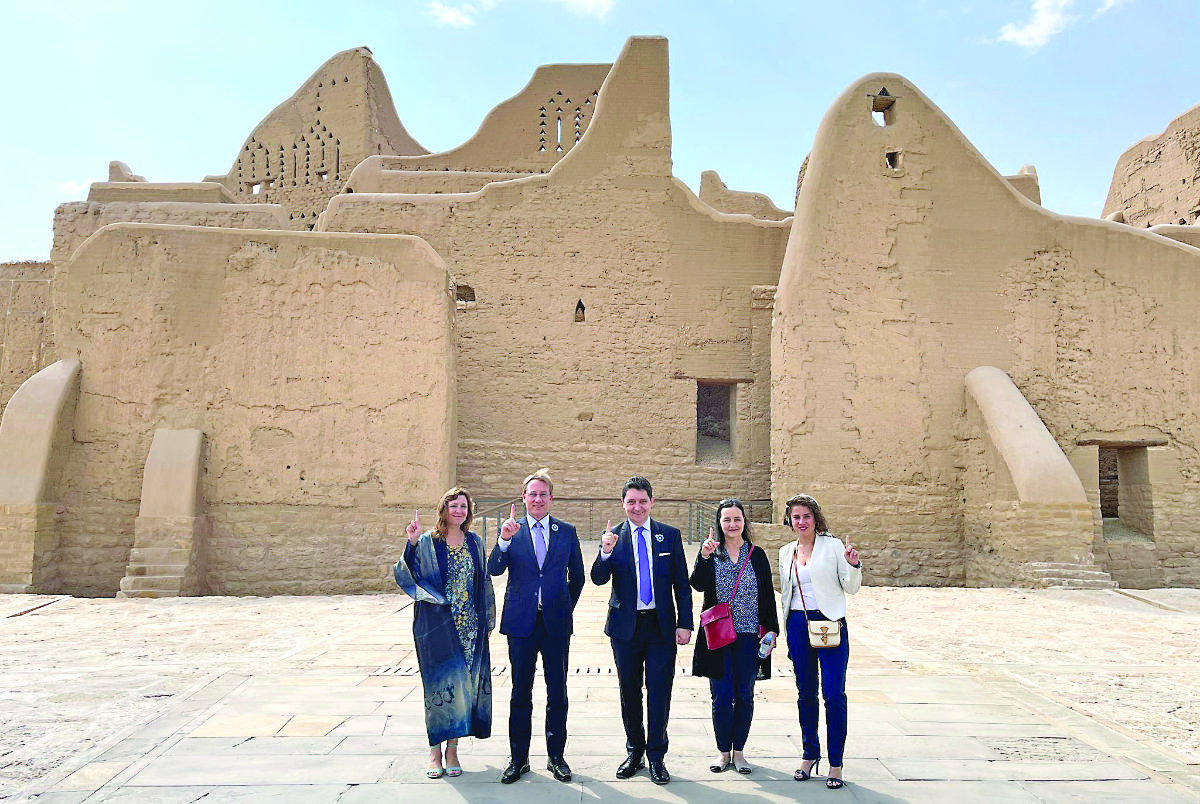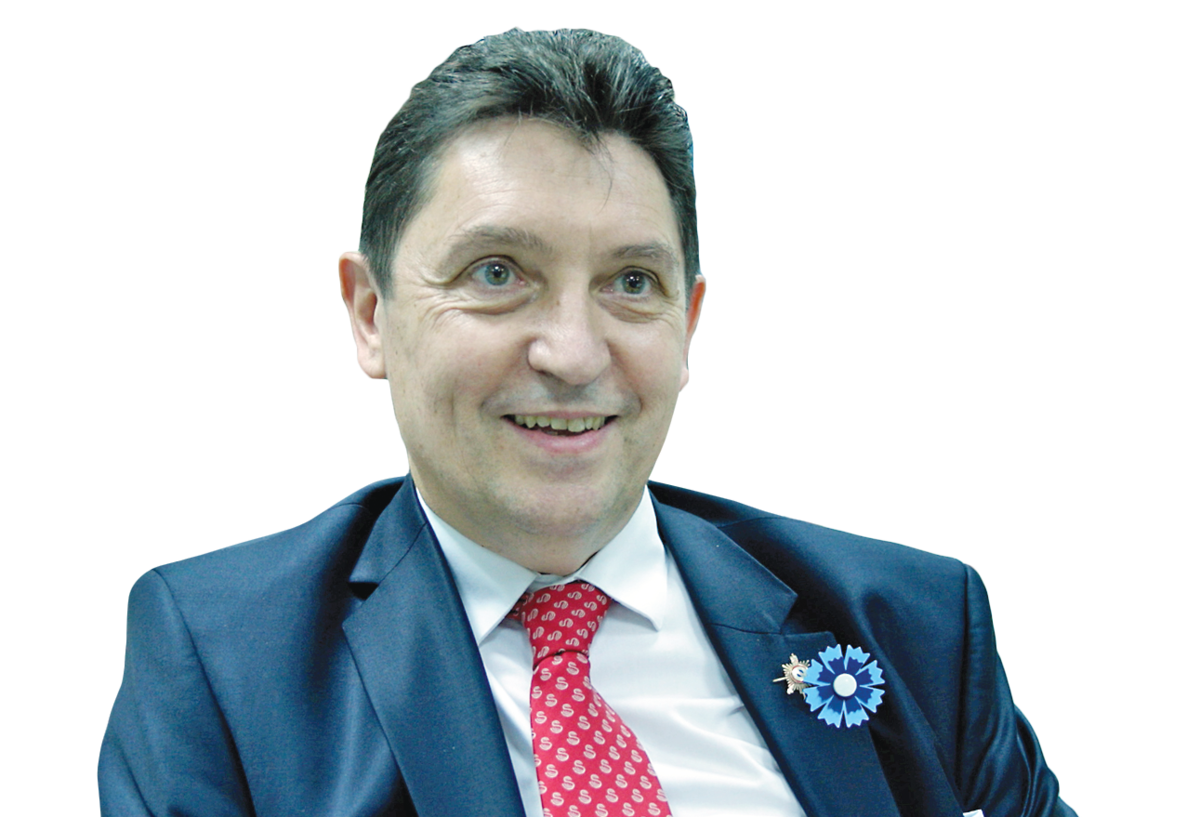RIYADH: French politician Olivier Cadic no longer recognizes Saudi Arabia. During a trip to the Kingdom to prepare for a visit by the France-Gulf countries friendship group he chairs in the Senate, he said he is enthusiastic about the “profound evolution” of the country since the launch of Saudi Vision 2030.
The senator, who represents French expatriates and has visited 99 countries during 410 official trips, said he was touched by the welcome he received in the Kingdom.
“This is the first time that a parliamentarian from the host country has been there to welcome me as soon as I get off the plane,” he said. “This fact has a unique meaning and indicates that the level of friendship between Saudi Arabia and France is at its optimum.
“I am grateful to the Shoura (Council) for its welcome, and the manner in which a French parliamentarian is treated. I will never forget them and I will never forget Saudi Arabia.”
We have two countries looking to reform. President (Emmanuel) Macron is also seeking to fundamentally reform France. Reforming a country is not easy.
Olivier Cadic, French politician
During an interview with Arab News en Francais at the Alliance Francaise school in Riyadh, the French parliamentarian discussed the cooperation between the countries in the cultural, economic and military fields.
Q Since your election in 2014, and as president of the France-Gulf countries group in the Senate, you have seen the launch in 2016 of Saudi Arabia’s Vision 2030 and its implementation.
Five years later, what are your conclusions?
A Five years after launching this vision, I do not think we can reach any conclusions. We can only have observations. We can tell that this is a growing process and a dynamic has kicked in.
I noticed the difference because the first time I came to Saudi Arabia was in 2015, and when I returned in 2019, I did not recognize the country. This is my first observation.

Senator Olivier Cadic with French Ambassador Ludovic Pouille at the gated district of At-Turaif, northwest of Riyadh. It is one of the Kingdom’s most-significant historical treasures. (Supplied)
I am returning in 2021 to prepare for the friendship group visit. I would have liked to come back sooner, but the COVID-19 pandemic made it impossible to travel. What I perceive is an ongoing dynamic, a real internal revolution that takes into account the population of the Kingdom, which is a young population, and therefore I see a political will to be in agreement with its population, and that this energy will positively drive the country to new heights.
Q You have visited Saudi Arabia several times. What changes do you see?
A The first thing that stood out between 2015 and 2019 was that people’s demeanor has changed; I felt they were smiling more. It really surprised me.
Besides, I wanted my partner to come with me because the country has changed a lot since 2015 and I wanted to see this country through her eyes also, not just through mine. The change is really profound and when we had a first look we were surprised, as it was not very positive for her in 2015 and it was really important that she was by my side so that we can watch, together, this country change.
Q You are visiting the Alliance Francaise school in Riyadh. What developments you perceive in Franco-Saudi cultural relations?
A I come, for that matter, to observe certain programs in which France is invested. Obviously, the Alliance Francaise supports the Francophonie, the learning of French, which is the language of the Enlightenment, of Voltaire, of Rousseau, that carries the values of our country. It is of utmost importance that we can share our language and our culture.
With the friendship group, we also plan to go to AlUla because there is really a collective, common work on the site, where France is deeply engaged. We want to see in which way the work was done, and how the alliance of France and Saudi Arabia can help enhance this exceptional archaeological heritage. This is one of the many angles and it would be difficult to summarize them, since there are many projects that go in this direction. It shows the attachment of our two countries, these cultures that blend together so well.
There is, once again, a real evolution in Saudi Arabia to bring out this local culture, which I believe will shine. And if France can help in spreading your culture, then it would be a very beautiful gift of confidence that you are giving us, in allowing us to work with you on this marriage of our cultures.
Q What are the new forms of cooperation between France and Saudi Arabia taking place now?
A There is a lot of mixed cooperation. Some is of economic nature, at the corporate level, with significant investments by French companies in Saudi Arabia. An example that comes to mind is the investments in the energy sector that EDF (Electricite de France), which is investing an € 800 million in Saudi Arabia, can make. These are companies that are investing massively to help develop Saudi Arabia’s economy, to support the Vision 2030 project that truly carries the country.
Q What about military cooperation between the two countries?
A The first thing I would like to say is how affected France is to see these recurring attacks that Saudi Arabia is subjected to on a regular basis. I would like to say that our country stands alongside yours to fight against the aggressions it is suffering. That is really fundamental to me.
After that, obviously, we have a common work and collective issues in front of us.
We will certainly talk about the situation in Lebanon, which despairs us, as well as the Saudi government, I believe. However, we will have to find solutions. We cannot let down the Lebanese people who are suffering from this situation. We are now in extensive discussions.
We admire the announcements made by the crown prince at COP 26, such as Green Riyadh, for example, with this tree-planting project. There is here a vision of the future that emerges.
It has been five years now since (Crown Prince Mohammed bin Salman) announced Vision 2030, whereas it has only been five weeks since the president of the Republic announced France 2030. So somewhere, (the crown prince) might have inspired us, too, in looking ahead to reform your country.

Olivier Cadic, French politician
We have two countries looking to reform. President (Emmanuel) Macron is also seeking to fundamentally reform France. Reforming a country is not easy. This brings us together in all areas and that applies for diplomatic decisions as well as defense decisions. There are proximities. We think together. We work together. We are never very far from each other to make the decisions.
Q How is Saudi Arabia perceived in France today?
A My role is to allow the French to go beyond the cliches. There is an intellectual laziness in thinking that Saudi Arabia looks like this or that. It is a view inherited from the past. In fact, we are talking about a country without knowing it.
My wish is that the French realize that the changes in the country are profound. We cannot judge. You have to come and see this country, meet its people … (I) invite the French to come along with me to meet this country and to help it, to stand by its side, because I believe that Saudi Arabia may need France to help it succeed in its goals.
But France also needs the Saudis so it can move forward and, therefore, we must put all the cliches behind us, look at each other and work together. I think, given what Saudi Arabia is doing, the French will be in awe of the projects here in Riyadh, but also across the country.
What I wish is for the French to come here and discover this country.
A It all depends on how this pandemic will be defeated in order to be able to say where the country will be in 10 years. I think the country will surprise very much for a good and simple reason: I visited Saudi Arabia’s pavilion at Dubai Expo 2020 and I saw that it was the most visited of the 190 pavilions in the expo. This shows that there is an interest in your country.
In this pavilion are precisely displayed the vision, the projects on which the Kingdom is working. So if you want to know what Saudi Arabia will be like 10 years from now, let me give you a tip: Go visit the pavilion at Dubai Expo.




























